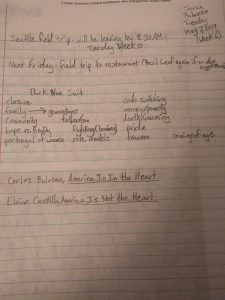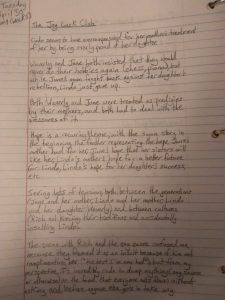
MonthMay 2019
My first thought upon reading this article was “oh, neat! I didn’t know anything about any of these people”! This thought prompted me to think about why that might be, which made me examine the article more closely. There is only one woman listed in this article compared to 4 men, two of whom are of Japanese descent. I know that women tend to be excluded from politics even now, but I wonder how much of this article is because there weren’t a lot of influential women in politics and how much is a male bias showing.
I also noticed that the only two people on this list are who are still alive are the two Japanese men. Could they not find any more recent people who were more influential? The list doesn’t say anything about who brought the “most” change, so why didn’t they include anyone who did things more recently? Is it because there hasn’t been enough time for newer people to do something really notable, or because it hasn’t been long enough to see if their work actually changed anything? Or is the person who wrote the article biased and just chose people who were talked about the most? Since I’ve never heard of any of these people before, it’s difficult to say.
All that being said, I also noticed that all of their political accomplishments listed in this essay have to do with equality and fighting discrimination. I wonder if that’s because they’ve all faced discrimination in one way or another and all used that to inform their political views, or if it’s a coincidence, or even if the author specifically chose them because of this.
Dark Blue Suit
- “From places as different as San Francisco and Walla Walla they came to Seattle, just as they had for twenty or more earlier springs, laying down their dishrags and field knives – the tools of dead-end jobs – for a chance to go north and make Union scale.” (pg 4) What does making “Union scale” mean? Is that a slang term for money? It must be important if they were willing to come all the way from places like San Francisco to Seattle for it.
- “All Filipinos, all Communists, all part of the Union, or so the government said.” (pg 21) Why did the government equate Filipinos with Communism? Was there something going on with the Philippines at the time that would make them think that? Or was it just the government being racist and using any excuse to get rid of Unions and “foreigners”?
- “ “Government say they’re Communist. We get rid of ‘em, they get off our back.” … “They’re good men strong for the Union. Besides, who’s nex’ we do that? You? Me?” ” (pg 22) This is something that we’ve seen played out throughout the years, even currently. If the people in charge can get minorities to turn on each other, they’ll be easier to control because they won’t have support from each other to bolster their strength and numbers. It’s sad that this keeps happening.
- Introduction
- Brief history of superheroes
- Lawrence, John Shelton, and Robert Jewett. The Myth of the American Superhero. W.B. Eerdmans, 2002.
- the original superhero archetype as conceived through Westerns, how it relates to American culture
- Modern superheroes and superhero culture, Marvel vs. DC, etc.
- Lawrence, John Shelton, and Robert Jewett. The Myth of the American Superhero. W.B. Eerdmans, 2002.
- Examination of how superheroes are presented in media
- Brownie, Barbara, and Danny Graydon. The Superhero Costume: Identity and Disguise in Fact and Fiction. Bloomsbury Academic, An Imprint of Bloomsbury Publishing Plc, 2016.
- How different identities are treated, levels of “realism”, white bias and “Everyman” status, etc.
- Superheroes as military propaganda (?)
- Brownie, Barbara, and Danny Graydon. The Superhero Costume: Identity and Disguise in Fact and Fiction. Bloomsbury Academic, An Imprint of Bloomsbury Publishing Plc, 2016.
Actor Ryan Potter of Big Hero 6 Fame Thrills Students at UC Riverside
First of all, I had no idea who the guy who played Hiro in Big Hero 6 was before finding this article, let alone that he was Japanese-and-Jewish American, so that’s really neat!
I like that he talks about representation and diversity, because it is so important for self-esteem and mental health to see yourself represented when you’re a kid. At first I was confused when he said that he was hesitant to audition for a role because Nickelodeon wasn’t very diverse, but then I thought about the shows I watched on that channel growing up and realized that, yeah, it was mostly white people. Any other ethnicities were either sidekicks, minor characters, or practically nonexistent. And when I was a kid, I didn’t pay any attention to that kind of thing, let alone whether those characters were played by the same ethnicity actors or not. It’s only when I got older that I realized how important it was.
I did notice, however, that the roles he had taken up until playing Beast Boy seem to fit into stereotypes about Japanese people; first he plays a ninja who’s good at martial arts, then he plays a super-smart prodigy kid who builds robots. I probably wouldn’t say that Hiro is a completely stereotypical character, but there’s definitely elements of those stereotypes involved in his characterization. Regardless, this feels like another example of Asian people being locked into playing certain types of characters, but maybe for him playing Beast Boy will break him out of that and prompt writers to give him different types of characters? I haven’t seen the Titans series that he’s in, so I don’t know how the writers treat Beast Boy in it, but hopefully they didn’t add racist stereotypes to his character just because the actor is Asian.
© 2025 Sarah's A-POP Blog
Theme by Anders Norén — Up ↑
